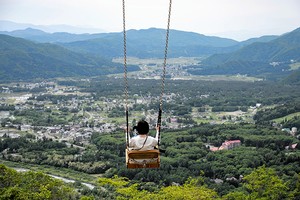By TSUNETAKA SATO/ Staff Writer
March 26, 2022 at 08:00 JST
OBAMA, Fukui Prefecture--For those wanting a taste of life aboard the International Space Station, they can now do so, thanks to the efforts of enterprising high school students here.
The students have teamed with local businesses to serve consumers on this planet with the same delicacy as they served to Japanese astronaut Soichi Noguchi in orbit above the Earth.
The canned mackerel for astronauts, created by those studying at Fukui Prefecture-run Wakasa High SchoolŌĆÖs Marine Science Course, was made commercially available on March 8 as the date 3/8 can be read as ŌĆ£sabaŌĆØ (mackerel) in Japanese.
Koei Fukushima and Arata Watanabe,┬Ātwo┬Āsecond-year students at Wakasa High School, expressed their high expectations for the collaboration, stating that they want people ŌĆ£from children to adults to learn what space food tastes likeŌĆØ with their invention.
The effort started in 2006, when┬Āstudents at a predecessor of Wakasa High School, the Obama fisheries high school, started developing the seafood product featuring the local specialty fish traditionally delivered to Kyoto through a road named after the species.
Their brainchild was granted Japanese-style space food status in November 2018 by the Japan Aerospace Exploration Agency (JAXA).
The mackerel can is marked by its viscosity reinforced by kudzu powder to hinder the fluid seasoning from floating in the air in a zero-gravity environment. The fish is also strongly flavored with soy sauce because food has less flavor when eaten outside the Earth.
A total of 300 students were involved in the 14-year project for their shared dream, and the fish can was finally┬Ādelivered to Noguchi aboard the ISS in November 2020.
A released video of Noguchi sampling the mackerel and praising it as ŌĆ£deliciousŌĆØ in the gravity-free conditions attracted public attention. But the high schoolersŌĆÖ endeavor did not end there.
Chiharu Hata, a second-year student at the Marine Science Course, and others began seeking to put their item on sale in the hopes that ŌĆ£our profits will be passed on to the local community by having people nationwide consume the canned mackerel.ŌĆØ
A challenge was that producing the space food manually requires much time, resulting in an expensive sale price. Local companies, inspired by the studentsŌĆÖ enthusiastic efforts, offered their assistance to address the issue.
Food can maker Fukui Kanzume in Obama adjusted its machine to render the seasoning sticky with kudzu automatically for mass production based on the high schoolersŌĆÖ recipe. Use of Norwegian mackerel made it possible to lower the price to 700 yen ($5.90).
Hiroshi Shigeta, 37, an official of Fukui Kanzume, touted the commercial version of the childrenŌĆÖs innovation as ŌĆ£successfully replicating the taste of the original product.ŌĆØ
The canŌĆÖs external design was determined by taking into account the studentsŌĆÖ ideas. A mackerel in a space suit bearing the academyŌĆÖs emblem was painted on it, while the developments in the high schoolersŌĆÖ research project are┬Āsummarized there in English for non-Japanese purchasers.
Fukui Bussan Co., an Obama-based enterprise, came forward likewise to deliver the finished mackerel can.
The product hit the shelves at the Wakasa Obama roadside rest area, the Wakasa Fisherman's Wharf commercial complex and elsewhere in Fukui Prefecture. It is sold on the internet at (http://fbk-wakasanotakara.raku-uru.jp) for patrons outside the prefecture as well.
With a sales goal of 20,000 units a month, inquiries have reportedly come in from the operator of a nationwide retailer chain along with other parties.
ŌĆ£We will nurture the product as one representing Fukui Prefecture,ŌĆØ said Yoshihiko Matsubara, 46, a Fukui Bussan official.
The 90-gram space mackerel can carries a price tag of 756 yen after tax.




















A peek through the music industryŌĆÖs curtain at the producers who harnessed social media to help their idols go global.
A series based on diplomatic documents declassified by JapanŌĆÖs Foreign Ministry
Here is a collection of first-hand accounts by ŌĆ£hibakushaŌĆØ atomic bomb survivors.
Cooking experts, chefs and others involved in the field of food introduce their special recipes intertwined with their paths in life.
A series about Japanese-Americans and their memories of World War II